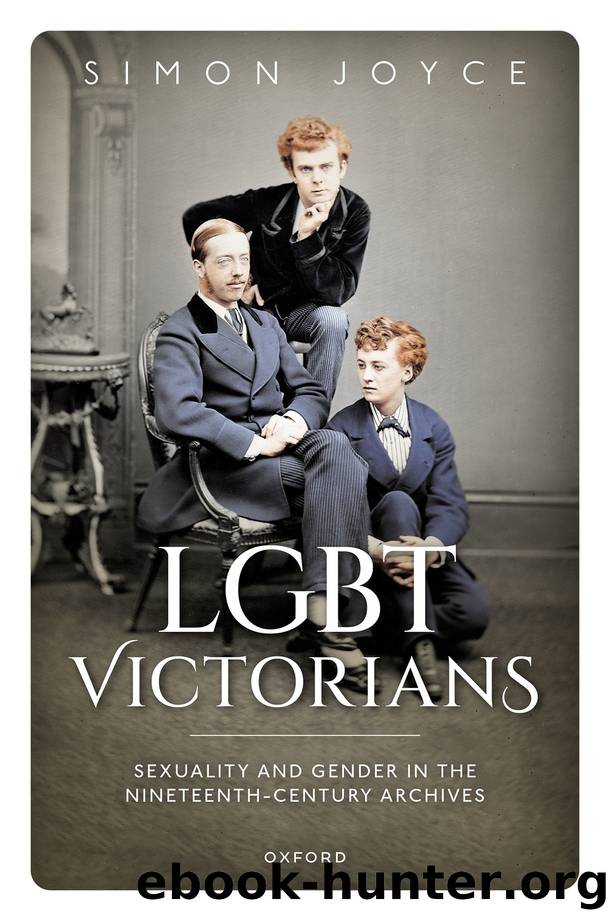LGBT Victorians by Simon Joyce

Author:Simon Joyce [Joyce, Simon]
Language: eng
Format: epub
ISBN: 9780192674203
Publisher: OUP Oxford
Published: 2022-07-18T00:00:00+00:00
This reciprocated touch is equally crucial to Whitmanâs vision of democratic reconstruction of the United States after the Civil War, as seen in the vision of âa new friendshipâ that
Shall circulate throughout The States, indifferent of place,
It shall twist and intertwist them through and around each otherâCompact shall they be, showing new signs,
Affection shall solve every one of the problems of freedom,
Those who love each other shall be invincible.83
These highly physicalized and intimate visions of homosocial comradeship were a central part of Whitmanâs appeal to Symonds, who was very much aware of the differences between them and his own tendency toward disembodied abstraction. As early as 1872, he had written to Whitman in praise of âCalamusâ and the celebration of adhesiveness in Democratic Vistas, admitting as he did so âhow hard I found itâbrought up in English feudalism, educated at an aristocratic public School (Harrow) and an over refined University (Oxford)âto winnow from my own emotions and from my conception of the ideal friend, all husks of affectations and aberrations and to be a simple human being.â The same letter enacts exactly the difficulty he is describing as he insistently links Whitmanâs present with an ancient Greece that he has only come to know through academic study. âI have pored for continuous hours over the pages of Calamus (as I used to pore over the pages of Plato),â Symonds writes, and the effect of this close reading was to place the texts in a form of dialog that was reminiscent of the providentialist model of history that he would have encountered at Oxford: âWhat the love of man for man has been in the Past I think I know. What it is here now, I know alsoâalas! What you say it can & shall be I dimly discern in your Poems.â84
In constructing this tripartite model of a despised present bracketed by a noble past and a Utopian future, part of Symondsâ difficulty was that he was too quick to make that future identical to the past, which is one reason why he was unable to fully engage with the issue of slavery in Greece. âFor a student of ancient literature,â he would tell Whitman nearly two decades after their correspondence had begun, âCalamusâ presented âa singular analogue to the early Greek enthusiasm of comradeship in armsâas that appeared among the Dorian tribes, and made a chivalry for prehistoric Hellas.â85 As Rutherford suggests, at moments like this Symonds was seeking agreement that the analogy holds, that âclassical Athens should matter in modern America,â in order to indicate âa way out of the inconceivability of ethical male-male sexual relationships in the modern world,â but it is not clear that the autodidactic Whitmanâwho did not know the Classical traditionâknew or cared enough to consider the question.86 As we have seen, for Symonds the key ethical problem of modernity increasingly revolved around the issue of whether idealized comradeship could at the same time place a positive value on physical relations, a question for which his reading of Plato and the Greeks had provided little comfort.
Download
This site does not store any files on its server. We only index and link to content provided by other sites. Please contact the content providers to delete copyright contents if any and email us, we'll remove relevant links or contents immediately.
| Civilization & Culture | Expeditions & Discoveries |
| Jewish | Maritime History & Piracy |
| Religious | Slavery & Emancipation |
| Women in History |
Cecilia; Or, Memoirs of an Heiress — Volume 1 by Fanny Burney(32527)
Cecilia; Or, Memoirs of an Heiress — Volume 2 by Fanny Burney(31928)
Cecilia; Or, Memoirs of an Heiress — Volume 3 by Fanny Burney(31915)
The Secret History by Donna Tartt(18998)
Sapiens: A Brief History of Humankind by Yuval Noah Harari(14344)
Leonardo da Vinci by Walter Isaacson(13291)
The Radium Girls by Kate Moore(12002)
Sapiens by Yuval Noah Harari(5345)
How Democracies Die by Steven Levitsky & Daniel Ziblatt(5200)
The Wind in My Hair by Masih Alinejad(5070)
Homo Deus: A Brief History of Tomorrow by Yuval Noah Harari(4890)
Endurance: Shackleton's Incredible Voyage by Alfred Lansing(4743)
Man's Search for Meaning by Viktor Frankl(4554)
The Silk Roads by Peter Frankopan(4511)
Millionaire: The Philanderer, Gambler, and Duelist Who Invented Modern Finance by Janet Gleeson(4446)
The Rape of Nanking by Iris Chang(4189)
Joan of Arc by Mary Gordon(4079)
The Motorcycle Diaries by Ernesto Che Guevara(4069)
Stalin by Stephen Kotkin(3938)
